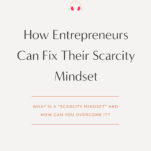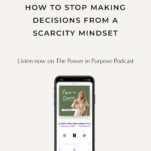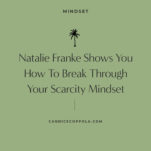Author and founder of the Rising Tide Society, Natalie Franke, wants you to know that you're built to belong.
Because the last 20 months… they haven't been easy. Wedding professionals and entrepreneurs are entering a new season of business and community. After over a year of hunkering down at home, in-person opportunities to connect and work together are once again opening up.
With these changes come new challenges of reconnecting in person AND overcoming increasingly fierce competition as more and more new businesses enter the market. Are you operating from a place of fear or are you operating from a place of hope? A mindset of scarcity or a mindset of abundance?
Natalie Franke is an entrepreneur, mobilization marketer, community builder, and neuroscience nerd…she really does it all. As one of the founders of the Rising Tide Society, the Head of Community at HoneyBook, and the author of the new book Built to Belong, she leads tens of thousands of creatives and small business owners while fostering a spirit of community over competition around the world.
This episode is part of our mindset series.
If you'd like to explore more episodes in this series, click here to binge them all.

In this episode, Natalie brings the truth about scarcity mindset in business. What is a scarcity mindset? Scarcity mindset is a mindset that we have all slipped into at one time or another as entrepreneurs… believing there are not enough clients or business for us. And that our competition is our enemy.
But what if you could believe that there IS enough for you–and that your competition isn't taking anything away from you–but rather, giving you something valuable?
On Today’s episode of The Power in Purpose Podcast with Natalie Franke, author of Built to Belong:
- What is a scarcity mindset
- How to get out of a scarcity mindset
- Why the need for competition and community can be at odds in our lives
Thanks for tuning into today’s episode of The Power in Purpose Podcast. I want to know– what was your biggest takeaway? Head to my Instagram to join the conversation!
Candice Coppola (Host)
Entrepreneurs are entering a new season of business and community. After over a year of hunkering down at home in person, opportunities to connect and work together are once again opening up. With these changes come new challenges of reconnecting in person and overcoming increasingly fierce competition. As more and more new businesses enter the market, you've been through a really hard thing over these last 18 months. My guest on today's episode of The Power and Purpose podcast, Natalie Franke, joins me to talk about how community can be the key to unlocking your scarcity mindset, helping you to push forward in your business.
Candice Coppola (Host)
Welcome back to The Power in Purpose podcast. It's me, your host, Candice and I've got a great guest on today's episode of this show– Natalie Franke. She needs no introduction, but just in case you're not sure who Natalie is, she is an incredible community builder and she's also the founder of the Rising Tide Society. We're adding author to her name because she is the author of the new book Built to Belong, which is available right now at all. Your favorite independent booksellers and all the major ones, too.
Candice Coppola (Host)
Natalie's joining me today to have a conversation about community and about scarcity. So many of us in business suffer from a mindset of scarcity. What is a scarcity mindset? And how can we unlock this mindset and free ourselves from believing that there's just not enough for us? Natalie and I go deep in today's episode to talk all about scarcity, what it means, how it affects you in your business, how it gets in the way of opportunities and true connection with other people, including your competitors. And I cannot wait for you to hear this episode.
Candice Coppola (Host)
It was hands down, one of my absolute favorites. Natalie delivers wherever she goes, there's no secret there. She over delivers and everything that she does. And she really showed up today for all of us to have this conversation about scarcity, what it means and how we can free ourselves from the scarcity mindset that follows us around.
Candice Coppola (Host)
Now, Natalie Frank is an entrepreneur. She is a mobilization marketer, a community builder and a neuroscience nerd. And as one of the founders of the Rising Tide Society, the head of community at our sponsor here HoneyBook. You know we love HoneyBook and the author of the new book, Built to Belong.
Candice Coppola (Host)
She leads tens of thousands of creatives and small business owners while fostering a spirit of community over competition around the world. She has been the person fighting this tooth and nail day after day for years. We're going to talk about her story and how this all came to be, this community over competition, the founding of the Rising Tide Society, how her book came to be. And then, as I mentioned, we're going to dig into scarcity mindset. You're in for a real treat today with my interview with Natalie.
Candice Coppola (Host)
Okay, so let's dive in to the interview.
Candice Coppola (Host)
Natalie, welcome to the show!
Natalie Franke (Guest)
Thank you so much for having me I'm so excited you're here.
Candice Coppola (Host)
You've been a bucketlist guest of this show for a long time since the day I started the podcast, and I'm so excited to have you as a guest, and I'm even more excited to introduce you as a published author. Congratulations!
Natalie Franke (Guest)
Thank you. It feels surreal. I'm getting really excited for this book to be out in the world.
Candice Coppola (Host)
I'm so excited for you. I'm reading the book right now. I'm over halfway through it. It is so good. The new book that's the first book that you've written, Built to Belong, Discovering the Power of Community Over Competition. It's soon to be available, I think, August 24, right?
Natalie Franke (Guest)
Yes. Yes.
Candice Coppola (Host)
A book launch is such a funny thing. It is so much work. How are you feeling right now with all of the promotion and your launch club and like all the things that you're doing for your book?
Natalie Franke (Guest)
Truthfully, I think. And I'm sure entrepreneurs, wedding professionals can relate to this. Actually, I'll make it an analogy to my wedding photography days. It feels like the preparation that goes into a wedding day or into a big event where you just have to execute as best you can learn. And iterate as you go, it has been a blast. It has been terrifying. It has been exhausting. It has been all of the things at once. But we know myself, my team, even our launch team. We know what we're fighting for.
Natalie Franke (Guest)
And it's not just a book, it's a mindset. It's something that we believe in so fiercely that I've been fighting for for over six years now. And it transformed my life, understanding the power of community over competition and what that really means, not what it sounds like, what it really means. And to know that in a few short weeks, folks that have never come across this idea have never come across me or any of the work that I've done are going to be introduced to this idea, perhaps for the first time.
Natalie Franke (Guest)
That is fuel that is fuel to my fire. It is my purpose and why I'm fighting so hard for this. And it keeps me going. So I'm excited, grateful, terrified, all of the above. But in the same way that all of us in our businesses and our lives have, that why that why we get up early and prep our gear and our equipment, why we invest in our education, why we do all the work that we do for our clients. It's always something deeper than just the day of it's about building something that means the to us.
Natalie Franke (Guest)
And so that keeps me feel. It keeps me fired up and going, yeah, for sure.
Candice Coppola (Host)
It is a wild ride launching a book. I love your thought process behind it. And just it's incredible gift to get into the hands of other people. And for many, maybe introduce them to the premise of this for the very first time, that their lives and their businesses can be enriched by their community. And in your book, you give us an inspiring call to anybody who's feeling lonely, anybody who's feeling like they don't have a community to discover the power of community and really begin a journey to true belonging.
Candice Coppola (Host)
So before we dive into what we're going to talk about today, which is all about scarcity mindset, I want to know, how did this book come to be so.
Natalie Franke (Guest)
Truthfully, this book came to be from my own journey with loneliness, my own journey with feeling alienated, with feeling that I myself was not worthy of love and belonging, that I wasn't worthy of the deep relationships that I created. I describe it sort of like there's such a distinct difference between how things seem and how things appear with how they truly are. And the book really rose up out of a season of my life, where on the outside looked like I had everything together, where I was checking all of the success metrics of life.
Natalie Franke (Guest)
I was doing all the things I set out to do. And if you were sitting on Instagram looking at me, you would say, oh, she's got it all. And I was so unbelievably alone. I was struggling with my mental health. I was going through one of many dark depressions that I've endured in my life. And I describe it in the book as there was this night where I was sitting at my laptop, and I've been sitting there all day, and I was exhausted. I had been editing images.
Natalie Franke (Guest)
I was behind on delivering wedding galleries. And I just remember there was no light in my room. I had been working all day. The sun had set. It was pitch black in that office, and the only light was coming from that laptop. And I truly felt in that moment, this voice within myself just come bubbling to the surface. And it just said to me, I'm tired of being alone. I'm tired of feeling lonely. I'm tired of longing for connection in the chaos. I'm tired of feeling like this computer, this device, this screen, the only light that I see, the light at the end of this tunnel is both giving me a chance to connect with other people, but is also leaving me feeling so deeply isolated is leaving me feeling like I'm lost in comparison.
Natalie Franke (Guest)
Like I'm jealous of what other people have, or I'm never gonna be enough. Or, you know, my friendships are shallow. They're not deep. They're not digging into the depths of life that I want to share with other people, their always surface level, these different feelings of just leading into the conversation of loneliness and how we can be surrounded by other people and still feel alone, how we can have a thriving business, a successful career, a growing family, whatever goals we set for ourselves and still feel so alone.
Natalie Franke (Guest)
And so that moment led to the creation of The Rising Tide Society. It led to sort of this internal quest within myself to not only solve this loneliness for me, but in the pursuit of doing that, perhaps help others to kind of solve those feelings of disconnect and alienation and loneliness that they're experiencing through their own lives, through their own lens, in their own unique ways, by building and cultivating deeper communities and connections and relationships. So it started from a place of loneliness, and it's been quite a journey from there.
Candice Coppola (Host)
Yeah, the beginning chapters of the book I could totally resonate with as you were describing your story, and you're achieving all these things and feeling so lonely while you do it is definitely something that I connected with. And I think so many other people connect with it, which is why the Rising Tide Society is so popular. And you have thousands of members all over the world because there is this craving while we succeed to do it amongst others and also help other people do it too. In the book, you talk about striking this balance between camaraderie and competition so that you can live a deeply fulfilled and joyfilled life.
Candice Coppola (Host)
And I think that something that gets in the way of striking that balance is a scarcity mindset, especially in the wedding industry, where you're sometimes really up against other people for jobs and you're competing in your own neighborhood hood and you're scrolling and you're seeing all these incredible things people are doing near you and even far away, and you can really kind of get into this comparison. And this scarcity mindset. Would you agree that sort of striking that balance between comradery and competition? There's some scarcity in that. And if so, would you mind sharing with our audience what you think scarcity mindset means?
Natalie Franke (Guest)
Absolutely. I agree with you wholeheartedly. I think one of the biggest challenges for all entrepreneurs, all small business centers, frankly, all human beings is navigating this balance like you reference. And we talk about in the book between the fact that we are built for belonging and we are built for community, and frankly, we can't survive without it. We need that collectivism. We need to be a part of something bigger than ourselves. And yet there's also, just as that is wired within us, this wiring for competition, this wiring to survive and to throw not just as an individual, but as a species.
Natalie Franke (Guest)
And you can see that not just in how we feel emotionally about different things that we encounter in our lives. So whether it's how we feel emotionally about the comparison scroll that you mentioned or building a business in a saturated market, but even how we feel about something. And I reference this in the book, like infertility Motherhood, feeling like I was falling behind, feeling like I watched everyone in my life achieve this thing that I wanted more more than anything in the world, and I couldn't have it.
Natalie Franke (Guest)
I couldn't join this party. That his motherhood. It was like waiting to be led into an amazing event and just standing there and watching everyone else get to go in front of you in line, and you just stand waiting and yearning. And there's so much of this balance between wanting to belong and wanting to be in community with others. And yet our brains are wired to compete and our brains are wired to achieve and to hit our goals in life, whether they're personal or professional. And what's really interesting when we look at this duality, these two sort of existing realities in our mind, cooperation, camaraderie, and then on the other side, competition, survival, and then the ability to succeed.
Candice Coppola (Host)
Right.
We oftentimes view one is good and one is bad, or we oftentimes and even when I say community over competition, people will say, oh, well, she doesn't believe in competition, or competition is inherently negative in some way, and that's just not the case. Community can be difficult for folks in the same way that competition can be difficult for folks. But what I found in my life is it's understanding that there needs to be this balance. And I advocate for putting community first, for seeing that both exist, seeing the duality and saying I see that I have both a need to belong, and I was created in some ways to compete, and I'm going to choose to allow both to exist within me, to drive me forward as an individual.
Natalie Franke (Guest)
But when push comes to shove, I'm going to choose healthy competition. I'm going to choose putting people first. And where scarcity comes into play here is Scarcity thrives in unhealthy competition. Scarcity thrives on mindsets of fear, doubt, insecurity the lack thereof, whereas it's alternative abundance. Mindset thrives in the idea that there are more than enough resources to go around. There is more than enough success to share with others. And both of these mindsets, abundance and scarcity have existed for a long time, but we're first coined by Stephen Covey in 1989, so this idea is not new.
Natalie Franke (Guest)
However, I fiercely believe that the way we leverage technology today in 2021 very different from the way that we lived in the world as individuals in 1989, for sure.
Candice Coppola (Host)
And listen, Steven got me through COVID with his circles of control, influence, and concern. If I didn't have that in my toolkit, I don't know if this podcast would be continuing. It literally got me through.
Natalie Franke (Guest)
Yes, and I'm a huge fan of the seven Habits of Highly Effective People. I mean, it's been around forever, but it has been something that I reference from time to time, specifically for myself. And he does some incredible work. And I think when we look specifically at Scarcity mindset as it relates to this conversation, it's sort of something that runs rampant in highly competitive spaces. So whether we're talking about business, academics, athletics, it's thrives in spaces where resources are objectively scarce, perhaps perceived to be scarce.
Natalie Franke (Guest)
But what happens is, as we look at, let's say, the wedding industry, for example, and we might look at it from a couple of different perspectives. One of those perspectives could be, well, there's just not enough work to go around. There aren't enough clients for everybody. This is a race to the bottom. I have to fight to get my tiny slice of the pie. And in that mindset, you develop sort of a mentality of fear around resourcing. You approach things, not from the perspective of how can we all win?
Natalie Franke (Guest)
Like, what is the win win here for everybody? You approach it from I need to win. I need to win. I need to win. Right? I need all the wins. Not my win, not my slice of the pie. I gotta have it all. I'm afraid if I don't get this plan, I'm not gonna get the next one. If I raise my prices, no one's going to book me. There's just not enough to go around. I've got a discount myself. If I'm not hitting certain metrics, it's based in fear scares me.
Natalie Franke (Guest)
Says, for example, I have to be the best, not I have to be my best. That's what Abundance resonates. An Abundance says again, the antithesis of scarcity. It says, There is more than enough to go around. So I don't need all the clients. I need my clients. I need to be my best. And being my best doesn't mean being better than her. It means being better than the person I was yesterday. It means growing from the foundation from which I am blooming. It means continuing to improve me and what I'm doing in my business and how I'm showing up and serving my clients and educating and investing in the greatest resource that I have, which is my mind, right?
Natalie Franke (Guest)
That is abundance. Abundance is being my best. Scarcity is like, what's lacking what's not out there. What's wrong with what I'm doing? An Abundance says, Well, what's possible? You know, Scarcity is saying I've got to beat other people in order to succeed. An Abundance says, no, we've got to serve others in order to succeed. Serving clients is what grows the business, not beating your competition.
Candice Coppola (Host)
That's a good one right there. Oh, that is so. God, you're so right. You're so I feel like we all need to hear this today and maybe many times in the future when I was reading your book and you talked about I need to be the best versus like, I need to be my best. That really stopped me because something that I think so many people don't recognize in themselves, and we're constantly trying to outperform other people instead of just working on ourselves and doing what feels right to us.
Candice Coppola (Host)
I often talk about building an growing a business and how so many folks in the wedding industry and many industries look to their competition and believe that that is what they need to do, or that's the type of business they should have rather than really sitting and thinking about, what do I want? What makes sense for my lifestyle, what makes sense for my goals, my desires, who I am as a person, my personality. And I think there's just a really interesting distinction there. My next question is about the signs of when we're in scarcity.
Candice Coppola (Host)
You mentioned a couple, but I'd love to spend a little time here. So what are some of the signs that you're leading with a scarcity mindset when it comes to making business decisions, but also decisions in your relationships?
Natalie Franke (Guest)
So the biggest marker of this, the biggest indicator that you're leading with Scarcity, is that you're making decisions out of fear and not out of hope. You're making decisions from a place of sort of unstable ground, of always feeling like there's a sense of urgency that's not based in excitement or enthusiasm or passion, but urgency based in that fear. And I think that's really the key marker. And then you can see that translated into things like, do you spend more time paying attention to what your competitors are doing than you do to what your clients are asking for?
Natalie Franke (Guest)
Are you focused on scrolling Instagram to consume content? Or are you focused on leveraging social media in order to connect with mentors, potential clients, your ideal audience? Those are two very different ways to approach, for example, social media. But even in business, when you're coming up with a marketing strategy, is that strategy based in sort of an understanding of your goals and where you're trying to grow as a business where you want to go and what you want to achieve? Or are those marketing strategies based again, on the fear of where you're falling short and the fear of how other people are operating and how you need to measure up, or you need to measure against how they're performing?
Natalie Franke (Guest)
There's a little area in the book where I talk about leadership, and there's just an idea here where you can't lead and operate from an abundance mindset. If you're constantly following in the footsteps of your competitors, you're constantly chasing after what they have. If you're afraid that somehow their success is taking away from your opportunities and your ability to win and to find success in your own right. And so the biggest sign it comes down to, are you operating from a place of fear? R, Are you operating from a place of hope?
Natalie Franke (Guest)
Are you focused on where you're going, or are you focused on where others are going? Are you concentrating on the needs of your clients, or are you concentrating on the output of your competitors? Those tend to be really good indicators around where your mindset is currently based. And I'll be very honest with one last little nugget here. It is natural for all of us as business owners to go through different seasons where it is more comfortable to operate in a place to abundance and seasons where we have to really work for it.
Natalie Franke (Guest)
We have to really call out consciously or behaviors that are enabling Scarcity to exist. And I've noticed in this sort of transitional period as we've been going through a pandemic now for a while, depending on where you live, certain things are beginning to open up. Vaccination rates are going up, so the world is starting to move towards a postpandemic reality. I don't believe we're there, but I think we're moving in that direction. It is very natural because you've spent so much time trying to survive over the last year and a half to now step into a world where it might be more comfortable to actually operate from Scarcity.
Natalie Franke (Guest)
It might be more comfortable to actually live in a space where there is that uncertainty about tomorrow, because we've spent the last year and a half and uncertainty we've spent the last year and a half barely trying to get through the day and unsure of what's going to happen not just to our business, but to our lives and our loved ones. And so I think this is a really good time to be having this conversation and a really good time to check in with yourself and just acknowledge where you are and acknowledge how you're navigating these decisions in your business and just check in.
Natalie Franke (Guest)
Am I still operating from that place of fear and need to survive, or am I allowing myself the opportunity to step into abundance, to have hope about my future and to move forward with decisions that are going to align with a mindset that ultimately will lead me to success? Because that's what this boils down to. We're not saying don't adopt a Scarcity mindset because it's not a fun place to be. We're truly saying here scarcity is not going to lead you to success. It's not two.
Candice Coppola (Host)
Yeah, you're right. And you bring up a really great point about Scarcity over the last 18 months. And one question I wanted to ask you was around this, with the world shutting down, and for so many people, business just plummeting overnight, we had to do whatever it took to keep the lights on. And so I think there was this instant switch into Scarcity because things were actually very scarce. And now that the world is opening back up, I see so many of my clients and so many wedding pros and so many creative juggling overbooked calendars where they physically are having a hard time fulfilling the demand that got moved and postponed with what they have already booked for the year with this desire to keep booking as much as they can because they're coming off of this season of Scarcity.
Candice Coppola (Host)
So how can we start believing that there's enough for us in business when those wounds of losing so much in our business are still so raw? Do you have any advice for us?
Natalie Franke (Guest)
Absolutely. So I think at first I just want to acknowledge I'm hearing the exact same thing for members in my own community, and these wounds that we've endured are tremendously deep, but we can transform our trajectory. One of the ways I recommend doing that is focusing outward. So Scarcity really encourages us to remain inwardly focused, to concentrate on what we're lacking, what we don't have, maybe what we didn't have last year. But abundance requires us to focus outwards, to shift our focus, to look beyond ourselves, beyond our insecurities, beyond our fears and our wounds, to look at ways to serve others, to look at ways to help others, to help our clients.
Natalie Franke (Guest)
And so when I talk about Scarcity, I talk about businesses that adopt a mindset of abundance. Again, they're focusing on their customers rather than chasing down their competition. Chasing down the competition may sound outwardly focused, but really, what it is is an external manifestation of an internal insight security, right. So you can't lead when you're following in the footsteps of somebody else. And so first step is really to look outward, to kind of acknowledge where those wounds exist, to acknowledge where that pain exists, those fears and securities that maybe are leading you towards the scarcity mindset and instead turn your gaze beyond.
Natalie Franke (Guest)
Turn your gaze to the clients you're serving. Turn your gaze to the knowledge and understanding that if you serve these clients well, even if that schedule feels overwhelming this year, if you serve them well, you're going to ultimately build a referral engine, right. That's going to lead into the future. If you make connections this year, if you continue to nurture relationships in the industry, same thing is going to happen. It's just it's taking that lens and shifting it from the fears within to the opportunity externally.
Natalie Franke (Guest)
And then I also think part part of it here is embracing your unique gifts and talents and truly understanding what you're trying to accomplish in this business that is unique to you. That isn't necessarily what someone else is doing or copy and pasting a strategy that you see someone else implementing. But really addressing from this mindset of abundance, the knowledge that if you lead into your unique giftings, your superpower, your talents, whatever it is that makes you the individual, the professional that folks want to work with, then you're going to build a business that has a solid foundation that's not rooted in hacks or today's marketing algorithm beating strategy or what the person down the street is doing, but you're rooting it in who you truly are and what you truly have to offer.
Natalie Franke (Guest)
And so in that vein, abundance encourages us to hone in on our strengths and encourage others to do the same thing. And that uniqueness creates clarity and competitive fields. So having unique and distinct businesses that either pursue and you know this, I feel like you talk about this often pursuing a unique clientele or having really a lot of clarity around what your value proposition is or what makes you different, what makes you unique and not trying to be like someone else, but trying to stand out.
Natalie Franke (Guest)
These are two very different approaches. By trying to stand out what you're also going to do despite the wounds and despite the insecurities, since you're going to set yourself up for success in your business, up for success long into the future because you're not competing against the masses, are you? You are a unique business and you're offering something different. You're standing out from the rest. And I think that's really important as well.
Candice Coppola (Host)
I do, too. I do think that there's been a lot of talk about this kind of enormous wedding bubble where there's just so many people getting married. And I think a lot of business is going to come behind that for those who were able to survive the pandemic and stay open. I also think that it's going to open the playing field. So while we saw, unfortunately, some businesses have to close permanently from the pandemic, I think it also opens up this opportunity for new businesses to start growing.
Candice Coppola (Host)
I think there's so many people who worked at nine to five who didn't love it and are now looking at entrepreneurship, working from home as the next greatest thing for them. We found that out a while ago, but there's this whole group of people who ve discovered over the last 18 months that they don't want to work for a company. They want to do their own thing, and they want to do it on their own terms. Little do they know. I saw a meme today where it was like I hated my nine to five.
Candice Coppola (Host)
So I decided to open a business, and now I work 24/7. They'll find out, suit up. But all of this to say, and I know you agree that there's just an increasingly fierce competition as new is businesses come to market. And I think we're going to see a lot of more new businesses come to market. We actually kind of need them, because I don't think there I think there's too much business to go around at this stage. And I know we know that community over competition is your purpose.
Candice Coppola (Host)
It's been the foundation of your life over the last six years. How do we need to think about competition today and going forward in our industries?
Natalie Franke (Guest)
Oh, it's such a good question. And I think there's sort of this reality. The competition will always exist in the marketplace. But I think you're onto something with this understanding that we may see an increasing number of individuals joining our industry over the next couple of months. I heard someone references the fall of freelancing. Basically this fall, it'll be everyone's leaving their jobs to freelance, especially as companies are trying to bring folks back into the other or kind of trying to bring things back to in some ways, how they were prior to the pandemic.
Natalie Franke (Guest)
And so I think your assessment is correct. And if we want to kind of approach competition in a healthy way, I think it sort of starts by understanding that, as I said, competition is not in itself a bad thing. And in reality, sometimes bringing new ideas to the market, bringing new voices to the table, bringing new professionals into the arena. It encourages all of us to be better. And I talked about this a little bit in the book, but I did a lot of different research before writing this book.
Natalie Franke (Guest)
And one of the most interesting things that I found is that we, as human beings, perform better in the presence of competition. When someone else enters the arena alongside us, we have a better output and this has been sort of studied both in humans and with others. Like, for example, I referenced in the book, there was a study then where weight lifters are able to bench press more weight when competing against others than when practicing by themselves. And we see even worker ants, so not even humans, but even little tiny worker ants.
Natalie Franke (Guest)
He'll dig more than three times as much sand per Ant simply when they are working alongside other ants, then when they're doing it alone. The reality here is that we often look at new competition entering the market. If we're operating from that place of scarcity, we become afraid. We become fearful of what that means. What I want to challenge us to do instead is to look at this as an incredible opportunity. More folks entering the market means that the way this industry looks is going to change.
Natalie Franke (Guest)
And that could be an incredible thing. Truthfully, not only for our businesses, but for our industry and for our clients. It's going to bring us sort of a reemergence of new ideas and innovation and excitement around what we're doing. It's going to enable us to connect with new people who could be the missing link in incredible relationships that we've been longing for in our own industry and network. Healthy rivalry, truly, truly, truly healthy rivalry. It is a beautiful thing for us professionally and personally, and I think rooting ourselves in the possibility that that will be helpful rather than hurtful to our businesses is the starting place.
Natalie Franke (Guest)
It's definitely it's definitely something that I think we don't always default to as business owners, but when we understand it's simply by increasing the competition in the arena, it's going to truly help us to even perform at our best. It's sort of an opportunity here that maybe we haven't had for quite a while.
Candice Coppola (Host)
Yeah, I would agree. And this goes to your philosophy that there is healthy and unhealthy ways of looking at competition. And so the unhealthy way is obviously what we're talking about. Scarcity mindset. This person is taking something from me. There's not enough for me and getting sort of that zone, which a lot of people can find themselves in, especially if some young, vibrant, smart person comes to market and they're just doing the things that you just never got a chance to do. You can definitely feel that way in scarcity in that unhealthy competitive sort of mindset.
Candice Coppola (Host)
And what you're saying is really shifting that and looking at what healthy competition is and how competition can be healthy for your business, helping you to pioneer to come up with new ideas. If you've been complacent in business, really healthy competition will help to kind of give you a little kick and get back in the game if you've just been sitting down on your laurels, I guess. But what are some of the benefits when you let go of unhealthy competition and really lean into healthy competition instead of looking inward, looking outward like you've mentioned, and foster a community with your competitors.
Natalie Franke (Guest)
Oh, what a good question. So look, the benefit here of embracing a healthy mindset around competition, embracing your competitors not as your enemy, but actually a part of your larger community is that you're going to have access to the collective knowledge, learnings and wisdom that all of your industry has to provide. When we first started Rising Tide, I remember folks being very skeptical about the idea of competitors gathering together. And actually, I even had a friend not too long ago. Ask me, how the heck do you get a group of competitors together?
Natalie Franke (Guest)
And the truth of the matter is I talk about the strategies to do this. So in the book, if you ever have thought yourself, I'd love to get a group of friends together in this way, actually create a community. Although we compete, you can learn how to do it in the book, I promise it's in there. But the biggest takeaway that I had is once these communities formed, once we had local groups meeting and gatherings happening and ideas being exchanged. People who adopted this mindset, business owners who stepped into the arena and said, You're not my enemy.
Natalie Franke (Guest)
You might be my competition. We might compete for business. But you're not my enemy. You're actually my friend. You're my colleague. You're someone I can share experiences with and stories with, getting advice from. Share what I'm learning. Here what you're learning. Innovate together. The minute that happened, anyone who didn't have that mindset started to notice that they were left in the dust. Anyone who wasn't willing to be open with their ideas, who wasn't willing to share and learn and grow alongside one another, fight for one another support.
Natalie Franke (Guest)
One another started to recognize, hey, the group that's sitting together, the group that's sharing ideas, the group that's talking about what's working and what's not. The group that's supporting each other through different, difficult client circumstances. Reschedules got COVID over the last year. The group that widened to their table and brought up more chairs and said, let's sit together and let's figure this out. We're not going o leave anyone behind. I truly believe fiercely that that is the group that's still standing today. Those are the groups that will be still standing five years from now.
Natalie Franke (Guest)
And so these communities become almost a necessity to continue moving forward in your industry. The folks that go at it alone, they're not going to go as far. They're not going to last as long because as we know, entrepreneurship is deeply challenging and the statistics are not in our favor. The statistics are not encouraging that can thrive in business. Actually, many of the statistics paint a very grim picture of just how many businesses last five years, ten years into their growth and into their expansion. And so I believe that just as community is a critical component to the world's longest living people, community is a component to the world's most successful businesses and business owners who are willing to come together.
Natalie Franke (Guest)
Yes, even with their competitors. Not in some false sense of humility, but in a desire to really raise the tide for everyone. They're the businesses that are going to still be standing at the most difficult seasons that we have yet to endure.
Candice Coppola (Host)
I totally agree. And listen, nobody understands what you're going through in your business right now more than your competition. So imagine being able to commiserate whatever situation is going on in your business with somebody who actually gets it rather than your partner or your spouse or your best friend or somebody on your team. I have been skeptical at times about community over competition, but early in my career I was really fortunate to meet some great people in the wedding industry. And back in the day before Rising Tide, there was something called Pug meetings.
Candice Coppola (Host)
I don't know if these were in your area, Natalie, but PICTAGE was trying to get photographers together, and so they pitched this idea of a Pug meeting. We would have speakers come. And it started off with photographers who make up like of the majority of the industry. There's so many of them. But because they were networking with florists and planners and other people, more people from the wedding industry started coming to these really fun meetings. And it was so nice to see people communicating, sharing knowledge, and creating a community around their industry.
Candice Coppola (Host)
And it helps me in my business so many different ways, from opportunities to writing my books to getting dream clients and doing photo shoots and speaking on stages and doing all these crazy, amazing things. I don't know if it would have ever happened if I was just hunker down in my office in front of my laptop, as you described in one chapter of your book, your experience never reaching out and meeting other people. So from a skeptic turned to convert. I would absolutely agree. And I want to end our interview talking about your book for all all of our listeners who are going to rush out and go purchase Built to Belong, you can preorder it if it's before August 24, in all the places it's in, target, it's on Amazon.
Candice Coppola (Host)
It's independent book sellers. And of course, after August 24, you can just go buy it anywhere.
Natalie Franke (Guest)
Yes. Yes.
Natalie Franke (Guest)
i'm so excited for this book to make its way into the world. And I know without a doubt that it will deeply impact entrepreneurs. It will deeply impact the wedding industry. And so I hope that you buy it. I hope you pick it up. And we talk about scarcity mindset in the book. We talk about healthy and unhealthy competition. We talk about comparison. We talk about scroll induce jealousy that leaves us feeling left out or left behind. But we also talk about how to chart a course for our life unlike any other to really embrace the fact that we are built for belonging.
Natalie Franke (Guest)
I mean, we are truly built for one another to be connected with one another. That is how we ultimately come to exist. It's the blending of DNA. It's the connection to our mothers. I mean, you talk about it in the book, but the reality here is human beings are built for belonging, and that doesn't mean you've always felt like you belong. And that doesn't mean that every space is welcoming. But what it does mean is that you you have an opportunity both to embrace that you are worthy of love and belonging, but also to step into the world, cultivating those spaces for yourself and for other people.
Natalie Franke (Guest)
And so the book charts the way to do that. It navigates difficult conversations around some of the subjects that we've mentioned, and I think it really kind of ends on what I hope is an empowering manifesto to kind of kick us into a better future together.
Candice Coppola (Host)
Oh, I love that. I was going to ask you, what does it mean to be built to belong? But you answered my question is just ingrained in our DNA as humans who we are. I think the book is magic. It has some really nerdy scientific stuff in it, which I love. I love nerding out on that stuff. And I have to say you've been nerding out on that for a long time. And I remember you were sharing some type of Instagram story, talking about community. This was years ago and sharing, like, statistics and talking about our brains and stuff.
Natalie Franke (Guest)
And I was like, oh, my God, she's so smart. And this all makes this all makes sense. What she's saying completely makes sense. So for those listening who love little statistic and some scientific evidence backing up Natalie's claims and what she's teaching you inside the book, it's all there. Yes.
Natalie Franke (Guest)
No, I'm definitely a nerd at heart. And I warned my publishing team when we wrote that. I said, I know this book sounds fluffy, but it is going to be deep. It is going to be very deep. And my hope is that whether you love stats or not, you take something really significant out of reading it and you leave this book a different person than when you opened it.
Candice Coppola (Host)
Oh, gosh, I love that. Natalie, thank you so much for joining us today on the podcast. I loved our interview. I learned so much about scarcity and abundance and ways that we can build and grow our communities. Tell our listeners where they can find you if they have not connected with you before.
Natalie Franke (Guest)
Absolutely. So you can find me online at Natalie Frank Com. If you're interested in the book, you can go to Natalie Frank Com book. Or just like Candice said, you can search for built to belong on Natalie. Every retailer out there where books are sold and Instagram tends to be the place where I hang out the most. So I'd say feel free to shoot me over a DM. You can just search my name Natalie Frank, and I look forward to connecting with you.
Candice Coppola (Host)
Natalie, thank you so much for being such a great guest. Thank you for having me I want to thank Natalie for joining me today on the Power and Purpose podcast. I told you, I told you Natalie always shows up and this episode Hands down has to be one of my favorites. There's so many little Nuggets in today's episode. I would love to know what resonated with you the most. And I'd also love to know if scarcity is something that you've been struggling with. And if you found that over the last 18 months with Covet and the world's shutting down and you losing business, if scarcity is something that is heightened for you, if you feel like you are operating from a place that there's just not enough business for you, that you've got to keep saying yes and taking on more work and doing more, and the competition is fierce and you've got a win, win, win, win, win.
Speaker 1
I would love to know. So do me a favor. Send me a DM on Instagram at @candice.coppola. I would love to hear from you. Also, be sure to go and thank Natalie for this great interview. And if there's something you want to share with her, please go do that. She's always in her DMs. She's so generous with her time, and I know that she would love to hear from you. I want to also encourage you to go pick up her book Built to Belong. I just finished it.
Candice Coppola (Host)
It is incredible. What an amazing achievement. It mixtures selfhelp with science, so good and so very timely for the world that we're living in right now. And I think the world we're going to be living in for the foreseeable future. Natalie wants you to be surrounded by a community because she knows firsthand what a community can do for you for your business. So go pick up her book, Built to Belong. I think you're going to be inspired to join a community, and I think you're going to be inspired to start a community where communities may lack and where you may need support like Natalie did.
Candice Coppola (Host)
Thank you so much for listening to today's episode of the Power and Purpose podcast. Don't forget to go sign up for my Tales from the Clipboard series. I'm sending you juicy, juicy emails about my time as a wedding planner, the good, the bad, the ugly, the horrific mistakes that I've made, the Bridezillas, the circumstances I found myself in over my twelve years. I'm laying it all out. It's funny. It's going to be a lot of fun. And I think if you are in the wedding industry, you're going to feel way less alone and some of the stuff that you've dealt with over your career.
Candice Coppola (Host)
So if you're interested in getting those emails. Go to https://candicecoppola.com/tales
Candice Coppola (Host)
Okay, I'm here to remind you, as always, that there's so much power in your purpose until next time. Okay, thanks so much for tuning in to this week's episode of The Power and Purpose Podcast. If you enjoyed the show, be sure to subscribe so you never miss an episode. And consider leaving a review head over to Power and Purpose Podcast com to access all of the resources and links mentioned in today's episode that's Power and Purpose Podcast com.
Candice Coppola (Host)
I'll see you next time.
Sign up to receive email updates
Enter your name and email address below and I'll send you periodic updates about the podcast.
Connect with Natalie Franke
- Purchase her new book, Built to Belong: Discovering the Power of Community Over Competition
- Check out her website
- Follow her on Instagram
- Join The Rising Tide Society
- Follower in on Twitter
- Catch up with her on Facebook
Explore More Wedding Industry Resources
Some of the links used in this blog post are affiliate links. When you purchase something, our company receives a small compensation at no cost to you. This compensation helps to maintain the cost of creating helpful content, like our podcast, so you can build a profitable business with purpose.












+ show Comments
- Hide Comments
add a comment